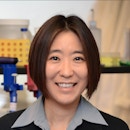Dynamic Evolution of the Spider Silk Gene Family
- Speaker
-
 Cheryl Y. Hayashi, Ph.D.Senior Vice President and Provost of Science, American Museum of Natural History
Cheryl Y. Hayashi, Ph.D.Senior Vice President and Provost of Science, American Museum of Natural History
The 2025 lecture series in biology is “Mechanisms of Evolution.” Evolution drove the incredible diversity of life on our planet. In this series, scientists will explore the underlying mechanisms that drive evolutionary change. Topics will include evolutionary adaptation, speciation, the dynamics of host-microbe interactions and more. By examining a wide range of organisms, these lectures will provide insights into how evolutionary processes have produced the complex web of life we see today.
2025 Lecture Series Themes
Biology: Mechanisms of Evolution
Mathematics and Computer Science: Discovering Mathematics Through Computers
Presidential Lectures are a series of free public colloquia spotlighting groundbreaking research across four themes: neuroscience and autism science, physics, biology, and mathematics and computer science. These curated, high-level scientific talks feature leading scientists and mathematicians and are designed to foster discussion and drive discovery within the New York City research community. We invite those interested in these topics to join us for this weekly lecture series.
There are more than 50,000 species of spiders, and they all spin silk. Indeed, spiders utilize an astounding diversity of task-specific silks with extraordinary properties. The extreme toughness of dragline silk rivals the best manufactured materials, while other silks can be incredibly stretchy or sticky. A single, spider-specific gene family encodes spider silk proteins (called ‘spidroins’). How can one gene family underlie the remarkable array of specialized silks found in nature? In this Presidential Lecture, Cheryl Hayashi will discuss the spidroin gene family and the evolutionary dynamics that have shaped the complexity of silk structure and function over the last 300 million years.
